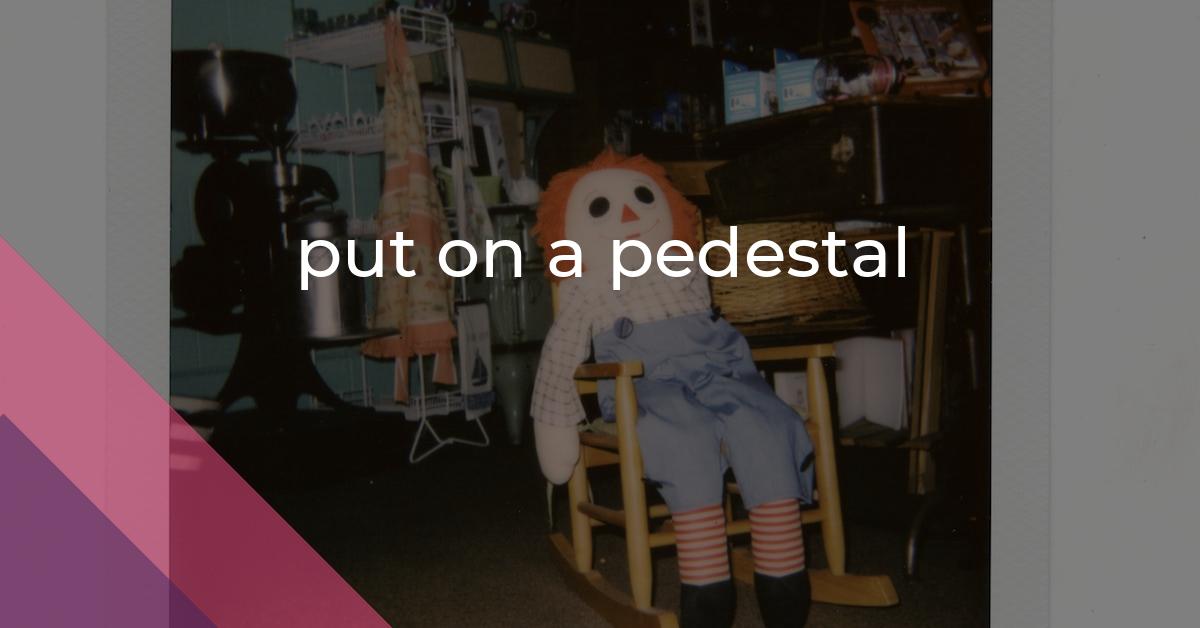put on a pedestal: Idiom Meaning and Origin
What does ‘put on a pedestal’ mean?
The idiom "put on a pedestal" means to admire or worship someone or something to an excessive extent, often idealizing them and treating them as if they are perfect or infallible.

Idiom Explorer
The idiom "think the world of" means to have a very high opinion or admiration for someone or something.
The idiom *put one's mind to it* means to concentrate or focus one's thoughts and efforts on a particular task or goal.
The idiom "put one's heart in" means to do something with great enthusiasm, passion, and dedication.
The idiom "put one's head in the sand" means to ignore or avoid reality or a problem, refusing to acknowledge it or take action. It is often used to describe someone who is in denial or unwilling to face the truth.
The idiom "put one's best foot forward" means to make a good impression or to present oneself in the best possible way, especially in a new or important situation.
The idiom "put on airs" means to act in a proud or pretentious manner, often to make oneself appear more important or superior than others.
The idiom "put on a clinic" means to demonstrate exceptional skill or expertise in a particular field or activity.
The idiom "put it past" means to believe or accept that someone is capable of doing something, often something unexpected or shocking, based on their past behavior or character traits.
The idiom "put forward" means to propose or suggest something for consideration or discussion. It is often used when presenting an idea, argument, or opinion in a formal setting or during a meeting.
Exalting Others
The idiom "put on a pedestal" is a common English expression that means to regard someone as superior or highly admirable. It is used metaphorically and does not involve an actual pedestal or physical elevation. When someone is put on a pedestal, they are highly respected and regarded as being above others.
The origins of the idiom can be traced back to ancient Greece, where statues of gods and goddesses were placed on pedestals as a symbol of reverence and veneration. These deities were considered superior beings, and by placing them on pedestals, they were elevated and held in high esteem. Over time, this association with reverence and elevation became linked to the idiom "put on a pedestal".
The idiom "put on a pedestal" has been widely used in various literary works, including poems, plays, and novels. It is often used to convey themes of idealization, hero worship, and the unrealistic expectations placed on individuals. Writers throughout history have explored the consequences and pitfalls of putting someone on a pedestal, highlighting the potential for disappointment or the loss of individuality.
In everyday conversations, the idiom "put on a pedestal" is commonly used to describe the elevation of someone's status or reputation. It is often used in the context of romantic relationships, friendships, or admiration for public figures. When someone is put on a pedestal, they are regarded as flawless, faultless, or beyond reproach. However, this can create an unrealistic image of the person and overlook their human flaws or shortcomings.
The related idiom "put on airs" is used to describe someone who is pretending or acting in a way that is more important or superior than they really are. It is often used to criticize someone for behaving in a pretentious or arrogant manner. This idiom is related to "put on a pedestal" as both involve the idea of someone trying to appear superior or better than others.
The idiom "think the world of" is used to express a high degree of admiration or regard for someone. When someone "thinks the world of" another person, they hold them in very high esteem and have a positive opinion about them. This idiom is also related to "put on a pedestal" as it involves regarding someone as highly admirable or superior.
The idiom "on one's high horse" is used to describe someone who is acting or behaving in an arrogant or condescending manner. When someone is "on their high horse," they are being overly self-important and displaying a sense of superiority. This idiom is related to "put on a pedestal" as both involve the idea of someone acting superior or considering themselves better than others.
The idiom "put on a pedestal" is a figurative expression that signifies the act of regarding someone as superior or highly admirable. Its origins can be traced back to ancient Greece, where idols and statues were placed on pedestals as a sign of reverence. The idiom is commonly used in literature and everyday conversations to convey themes of idealization and unrealistic expectations. While putting someone on a pedestal may initially seem flattering, it can lead to disappointment and the loss of individuality. It serves as a reminder of the complexities and potential pitfalls of idolizing others.
Example usage
Examples of how the idiom "put on a pedestal" can be used in a sentence:
- She is constantly putting her children on a pedestal and praising their every move.
- After his heroic act, the whole town put him on a pedestal as a local hero.
- The new CEO was put on a pedestal by the employees, but soon their perception changed when they realized their unrealistic expectations.
More "Admiration" idioms



